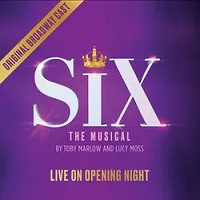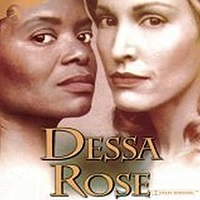 Original Off-Broadway Cast, 2005 (JAY)
Original Off-Broadway Cast, 2005 (JAY)  (4 / 5) Based on Sherley Anne Williams’ 1986 novel about the intertwined stories and gradual friendship of a Black woman and a white woman in the Antebellum South, Dessa Rose remains Lynn Ahrens and Stephen Flaherty’s most sweeping, ambitious score since Ragtime. It also makes for an epic cast album with a whopping 68 tracks and over two hours of material, including all dialogue (also by Ahrens) and all the necessary sound effects to convey the show’s dramatic events. Since Dessa Rose is heavily narrated by the title character (LaChanze) and Ruth (Rachel York), reminiscing in their old age, it’s easy to follow the plot from the recording once the two women meet and the show shakes loose its early flashback-within-a-flashback knottiness. As Dessa Rose, an enslaved woman willing to do anything to fight for her freedom, LaChanze, an early Ahrens and Flaherty muse (as in Once On This Island, a score that’s occasionally referenced here in some livelier ensemble moments), offers a gripping performance, especially in her Act One solos, “Something Of My Own” and “Twelve Children.” York is a terrific counterbalance as a prim Southern belle who opens her home and her heart to Dessa Rose and her companions fleeing slavery. Norm Lewis also gives a warmly winning performance as Nathan, who falls for Ruth, and Kecia Lewis sings the ballad “White Milk, Red Blood” movingly. Though the first act is rather exposition-heavy, and the longer soliloquies interrupt the album’s often-propulsive momentum, the show takes off in the second act once the two women turn against each other in a fiery pair of numbers, “Better If I Died” and “Just Over the Line.” It’s occasionally obvious that Dessa Rose shares its composer with Ragtime, but Flaherty ultimately carves out a tensely operatic sound for the score that stands alone among his works, powered by banjo-rich orchestrations courtesy of William David Brohn and Christopher Jahnke. (The rousing vocal arrangements are by Flaherty himself.) With its audio play expansiveness, the Dessa Rose cast recording makes for a compelling, powerful listen. — Dan Rubins
(4 / 5) Based on Sherley Anne Williams’ 1986 novel about the intertwined stories and gradual friendship of a Black woman and a white woman in the Antebellum South, Dessa Rose remains Lynn Ahrens and Stephen Flaherty’s most sweeping, ambitious score since Ragtime. It also makes for an epic cast album with a whopping 68 tracks and over two hours of material, including all dialogue (also by Ahrens) and all the necessary sound effects to convey the show’s dramatic events. Since Dessa Rose is heavily narrated by the title character (LaChanze) and Ruth (Rachel York), reminiscing in their old age, it’s easy to follow the plot from the recording once the two women meet and the show shakes loose its early flashback-within-a-flashback knottiness. As Dessa Rose, an enslaved woman willing to do anything to fight for her freedom, LaChanze, an early Ahrens and Flaherty muse (as in Once On This Island, a score that’s occasionally referenced here in some livelier ensemble moments), offers a gripping performance, especially in her Act One solos, “Something Of My Own” and “Twelve Children.” York is a terrific counterbalance as a prim Southern belle who opens her home and her heart to Dessa Rose and her companions fleeing slavery. Norm Lewis also gives a warmly winning performance as Nathan, who falls for Ruth, and Kecia Lewis sings the ballad “White Milk, Red Blood” movingly. Though the first act is rather exposition-heavy, and the longer soliloquies interrupt the album’s often-propulsive momentum, the show takes off in the second act once the two women turn against each other in a fiery pair of numbers, “Better If I Died” and “Just Over the Line.” It’s occasionally obvious that Dessa Rose shares its composer with Ragtime, but Flaherty ultimately carves out a tensely operatic sound for the score that stands alone among his works, powered by banjo-rich orchestrations courtesy of William David Brohn and Christopher Jahnke. (The rousing vocal arrangements are by Flaherty himself.) With its audio play expansiveness, the Dessa Rose cast recording makes for a compelling, powerful listen. — Dan Rubins
All posts by Michael Portantiere
Rocky
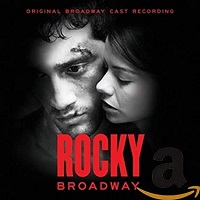 Original Broadway Cast, 2014 (UMe)
Original Broadway Cast, 2014 (UMe)  (3 / 5) Rocky finds Lynn Ahrens and Stephen Flaherty writing to order. At the center of this adaptation are two songs, from the film on which the musical is based and one of its sequels, that A&F had nothing to do with creating: ”Gonna Fly Now,” the iconic Rocky theme, and “Eye of the Tiger,” a big hit from Rocky III. The rest of the score seems forced to coalesce around those famous workout anthems. Most of the songs about boxing are undistinguished and indistinguishable from one another, recalling the film soundtracks as best they can. It’s a small miracle, then, that Ahrens and Flaherty, carve out space for a lovely collection of other songs charting the tender, tentative relationship of the down-on-his-luck boxer Rocky Balboa (Andy Karl) and the traumatized Adrian (Margo Seibert). As heard on the cast album, Seibert is stunning in the brief self-empowerment ballad “I’m Done,” and the pair are sweetly hesitant in the skating rink waltz “The Flip Side.” A&F gave themselves an additional challenge in writing so much material for the under-educated and semi-literate Rocky; for example, the halting “Adrian” feelingly showcases the pair’s gifts at writing for specific characters as it tests the limits of the protagonist’s self-expression. That said, the highlight of the score is Adrian’s “Raining,” one of Ahrens’ most haunting lyrics set to a surging, churning melody, tinged with electric guitar licks, that sounds unlike anything else Flaherty has penned. Too often, this score treads water until the next training montage, but with so much distraction in the ring, credit the writers with landing at least one knockout punch. — Dan Rubins
(3 / 5) Rocky finds Lynn Ahrens and Stephen Flaherty writing to order. At the center of this adaptation are two songs, from the film on which the musical is based and one of its sequels, that A&F had nothing to do with creating: ”Gonna Fly Now,” the iconic Rocky theme, and “Eye of the Tiger,” a big hit from Rocky III. The rest of the score seems forced to coalesce around those famous workout anthems. Most of the songs about boxing are undistinguished and indistinguishable from one another, recalling the film soundtracks as best they can. It’s a small miracle, then, that Ahrens and Flaherty, carve out space for a lovely collection of other songs charting the tender, tentative relationship of the down-on-his-luck boxer Rocky Balboa (Andy Karl) and the traumatized Adrian (Margo Seibert). As heard on the cast album, Seibert is stunning in the brief self-empowerment ballad “I’m Done,” and the pair are sweetly hesitant in the skating rink waltz “The Flip Side.” A&F gave themselves an additional challenge in writing so much material for the under-educated and semi-literate Rocky; for example, the halting “Adrian” feelingly showcases the pair’s gifts at writing for specific characters as it tests the limits of the protagonist’s self-expression. That said, the highlight of the score is Adrian’s “Raining,” one of Ahrens’ most haunting lyrics set to a surging, churning melody, tinged with electric guitar licks, that sounds unlike anything else Flaherty has penned. Too often, this score treads water until the next training montage, but with so much distraction in the ring, credit the writers with landing at least one knockout punch. — Dan Rubins
The Glorious Ones
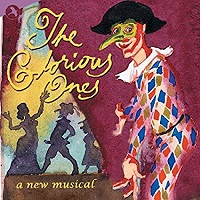 Original Off-Broadway Cast, 2008 (JAY)
Original Off-Broadway Cast, 2008 (JAY)  (3 / 5) The commedia dell’arte players who are the characters in Lynn Ahrens and Stephen Flaherty’s musical The Glorious Ones declare in the titular opening number that they will perform “with one hand on the crotch and one hand on the heart.” But Ahrens and Flaherty, from Once On This Island to Ragtime to Seussical, have been all blissful heart, and the songs in this score that strive for coarseness (“Making Love,” “Armanda’s Tarantella”) come across as semi-apologetic gropes. Flaherty’s flexible compositional voice usually molds artfully around the setting and style of each show, but The Glorious Ones never quite embraces a Flahertian version of 17th-century Italy. For example, the vaudevillian “Comedy of Love” and “Rise and Fall” sound a lot like Ragtime’s turn-of-the-century showbiz scenes. What is consistent about the score is the use of triple meter; like A Little Night Music, almost every song is in some variation of waltz time, although the lovely ballad “The World She Writes,” a metrical exception featuring the lush-voiced Erin Davie, is the album’s best track. By the time we arrive at the show’s apex, the impresario Flaminio Scala’s post-mortem soliloquy “I Was Here,” that song in three-quarter time rhythmically blends into too much of what’s come before. Still, Flaherty is a masterful melodist, and Ahrens is ever-thoughtful and clear in her lyrics, so the score never grates. As Flaminio and his lover Columbina, Marc Kudisch and Natalie Venetia Belcon get the meatiest music, but Julyana Soelistyo as the dwarf Armanda, leading the potent “Armanda’s Sack,” makes the most lasting impression. Michael Starobin’s orchestrations shimmer characteristically, especially in his gentle brass writing. The album features a few bonus tracks, including a brief orchestral suite. — Dan Rubins
(3 / 5) The commedia dell’arte players who are the characters in Lynn Ahrens and Stephen Flaherty’s musical The Glorious Ones declare in the titular opening number that they will perform “with one hand on the crotch and one hand on the heart.” But Ahrens and Flaherty, from Once On This Island to Ragtime to Seussical, have been all blissful heart, and the songs in this score that strive for coarseness (“Making Love,” “Armanda’s Tarantella”) come across as semi-apologetic gropes. Flaherty’s flexible compositional voice usually molds artfully around the setting and style of each show, but The Glorious Ones never quite embraces a Flahertian version of 17th-century Italy. For example, the vaudevillian “Comedy of Love” and “Rise and Fall” sound a lot like Ragtime’s turn-of-the-century showbiz scenes. What is consistent about the score is the use of triple meter; like A Little Night Music, almost every song is in some variation of waltz time, although the lovely ballad “The World She Writes,” a metrical exception featuring the lush-voiced Erin Davie, is the album’s best track. By the time we arrive at the show’s apex, the impresario Flaminio Scala’s post-mortem soliloquy “I Was Here,” that song in three-quarter time rhythmically blends into too much of what’s come before. Still, Flaherty is a masterful melodist, and Ahrens is ever-thoughtful and clear in her lyrics, so the score never grates. As Flaminio and his lover Columbina, Marc Kudisch and Natalie Venetia Belcon get the meatiest music, but Julyana Soelistyo as the dwarf Armanda, leading the potent “Armanda’s Sack,” makes the most lasting impression. Michael Starobin’s orchestrations shimmer characteristically, especially in his gentle brass writing. The album features a few bonus tracks, including a brief orchestral suite. — Dan Rubins
Between the Lines
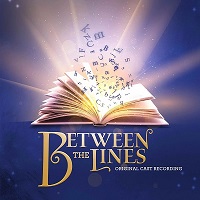 Original Off-Broadway Cast, 2022 (Ghostlight)
Original Off-Broadway Cast, 2022 (Ghostlight)  (3 / 5) Are you ever too old to fall in love with a fairytale? Or a fairytale prince? This question is the basis for Between the Lines, a musical by Elyssa Samsel and Kate Anderson that premiered Offf-Broadway in 2022. The show centers on troubled teen Delilah McPhee, who has to navigate life as a target of school bullies and the daughter of a divorced, broke, single mother. In order to survive her situation, Delilah has to find a way out, and she does that by falling in love with the prince from a fairytale book she has recently begun to read, the only copy of which happens to be in her school library. As the location of the show switches back and forth between reality and the fantasy world of the book, it’s easy for the cast album listener to get lost, all the more so because no interstitial dialogue is recorded here. For example, does Will Burton’s charming soft-shoe “Out of Character” come off as well if you don’t realize until the end of the song that he’s playing a dog? Or will you understand that, when Vicki Lewis performs “Can’t Get ‘Em Out,” she is playing the book’s author rather than a therapist or one of the few other characters she portrays in the show? As for the score itself, the main problem it that it suffers from a lack of originality. Since there are comparatively few teenage musicals, it’s impossible not to draw comparisons between this show’s high school outcast anthem “Allie McAndrews” and “I’d Rather Be Me” from Mean Girls, or between “Leaps and Bounds,” the nostalgic ballad heartbreakingly performed here by Julia Murney as Delilah’s mother, and, say, “Stop, Time” from Big. None of this is meant to suggest that Between the Lines is without its merits, the greatest ones being the catchiness of the tunes, whether melancholy or up-tempo, and the charming vocal performance by Jake David Smith as the handsome prince. Arielle Jacobs’ portrayal of Delilah is also compelling, and if some of the challenging score lies a bit outside of her vocal range, she has the acting chops to make up for it. Because of the many nice opportunities this show affords its cast in addition to the relatable story, it almost cries out for regional productions, and one can easily imagine that some of the score’s solo ballads will become audition room standards. So, ultimately, Between the Lines is worth your time, even if it’s a story you may feel you have read before. –– Charles Kirsch
(3 / 5) Are you ever too old to fall in love with a fairytale? Or a fairytale prince? This question is the basis for Between the Lines, a musical by Elyssa Samsel and Kate Anderson that premiered Offf-Broadway in 2022. The show centers on troubled teen Delilah McPhee, who has to navigate life as a target of school bullies and the daughter of a divorced, broke, single mother. In order to survive her situation, Delilah has to find a way out, and she does that by falling in love with the prince from a fairytale book she has recently begun to read, the only copy of which happens to be in her school library. As the location of the show switches back and forth between reality and the fantasy world of the book, it’s easy for the cast album listener to get lost, all the more so because no interstitial dialogue is recorded here. For example, does Will Burton’s charming soft-shoe “Out of Character” come off as well if you don’t realize until the end of the song that he’s playing a dog? Or will you understand that, when Vicki Lewis performs “Can’t Get ‘Em Out,” she is playing the book’s author rather than a therapist or one of the few other characters she portrays in the show? As for the score itself, the main problem it that it suffers from a lack of originality. Since there are comparatively few teenage musicals, it’s impossible not to draw comparisons between this show’s high school outcast anthem “Allie McAndrews” and “I’d Rather Be Me” from Mean Girls, or between “Leaps and Bounds,” the nostalgic ballad heartbreakingly performed here by Julia Murney as Delilah’s mother, and, say, “Stop, Time” from Big. None of this is meant to suggest that Between the Lines is without its merits, the greatest ones being the catchiness of the tunes, whether melancholy or up-tempo, and the charming vocal performance by Jake David Smith as the handsome prince. Arielle Jacobs’ portrayal of Delilah is also compelling, and if some of the challenging score lies a bit outside of her vocal range, she has the acting chops to make up for it. Because of the many nice opportunities this show affords its cast in addition to the relatable story, it almost cries out for regional productions, and one can easily imagine that some of the score’s solo ballads will become audition room standards. So, ultimately, Between the Lines is worth your time, even if it’s a story you may feel you have read before. –– Charles Kirsch
Kimberly Akimbo
 Original Broadway Cast, 2023 (Ghostlight)
Original Broadway Cast, 2023 (Ghostlight)  (5 / 5) Based on David Lindsay-Abaire’s play of the same title, Kimberly Akimbo tells the story of Kimberly Levaco (Victoria Clark), a girl with a rare disease that causes her body to age rapidly, causing her to look 65 at the age of 16. Despite this major setback, Kimberly is determined to enjoy as much of her life as she can, since she’s unsure just how much longer her life will last. It’s that blend of sardonic edge and heartfelt optimism that ultimately makes this such a special musical. In their second collaboration, Lindsay-Abaire and composer Jeanine Tesori have created an unassuming work that hides its creativity and complexity in plain sight. Abaire’s lyrics are exceptionally intelligent, sometimes taking twisted turns (the hilarious “Better”) and sometimes deeply earnest (the quietly devastating “Before I Go”), but always organic to the story and characters, and never calling attention to themselves. Tesori, meanwhile, proves once again that she is one of the most versatile musical theater composers around. She has created here a score filled with pastiches of numerous song genres (’90s folk, ’70s disco, blues, current pop, faux-classical), yet the score never has the feeling of oscillating from one style to the other; rather, it seamlessly blends. The cast is exceptional. Steven Boyer and Alli Mauzey are appropriately narcissistic as Kimberly’s parents, getting a chance to show their characters’ messiness (in Boyer’s “Happy for Her” and Mauzey’s “Hello Darling” and reprises) while also displaying some depth (in “Hello Baby” and “Father Time”). Bonnie Milligan is a scene stealer as Kimberly’s delinquent aunt Debra, whose latest scheme consumes much of the plot of Act Two. Given the most off kilter humor of the show, Milligan offers dry delivery of dialogue and barn raising vocals that ground Abaire’s comedy, keeping songs such as “Better” and “How to Wash a Check” from going off the rails. Justin Cooley is incredibly charming as Kimberly’s classmate Seth, who has a passion for making anagrams (the show’s title is a blend of Kimberly’s name and the anagram Seth makes out of it). At the center of it all, Clark is other-worldly good in the title role. In songs like “Anagram” and “Make a Wish,” one can hear her communicate Kimberly’s teenage spirit while also embracing the character’s elderly body and voice, but Clark refuses to go broad or become a caricature. Like the musical itself, the simplicity of her performance is what makes it so profound. Happily, the audio quality of this recording is so crisp and clear that listeners can hear every nuance of the vocal performances, as well as John Clancy’s multi-faceted orchestrations and Tesori’s tight vocal arrangements for the teenage ensemble. One could keep going on about every minute aspect of this cast album, but the ultimate praise is to tell you to just go ahead and listen. And then listen again. And again. — Matt Koplik
(5 / 5) Based on David Lindsay-Abaire’s play of the same title, Kimberly Akimbo tells the story of Kimberly Levaco (Victoria Clark), a girl with a rare disease that causes her body to age rapidly, causing her to look 65 at the age of 16. Despite this major setback, Kimberly is determined to enjoy as much of her life as she can, since she’s unsure just how much longer her life will last. It’s that blend of sardonic edge and heartfelt optimism that ultimately makes this such a special musical. In their second collaboration, Lindsay-Abaire and composer Jeanine Tesori have created an unassuming work that hides its creativity and complexity in plain sight. Abaire’s lyrics are exceptionally intelligent, sometimes taking twisted turns (the hilarious “Better”) and sometimes deeply earnest (the quietly devastating “Before I Go”), but always organic to the story and characters, and never calling attention to themselves. Tesori, meanwhile, proves once again that she is one of the most versatile musical theater composers around. She has created here a score filled with pastiches of numerous song genres (’90s folk, ’70s disco, blues, current pop, faux-classical), yet the score never has the feeling of oscillating from one style to the other; rather, it seamlessly blends. The cast is exceptional. Steven Boyer and Alli Mauzey are appropriately narcissistic as Kimberly’s parents, getting a chance to show their characters’ messiness (in Boyer’s “Happy for Her” and Mauzey’s “Hello Darling” and reprises) while also displaying some depth (in “Hello Baby” and “Father Time”). Bonnie Milligan is a scene stealer as Kimberly’s delinquent aunt Debra, whose latest scheme consumes much of the plot of Act Two. Given the most off kilter humor of the show, Milligan offers dry delivery of dialogue and barn raising vocals that ground Abaire’s comedy, keeping songs such as “Better” and “How to Wash a Check” from going off the rails. Justin Cooley is incredibly charming as Kimberly’s classmate Seth, who has a passion for making anagrams (the show’s title is a blend of Kimberly’s name and the anagram Seth makes out of it). At the center of it all, Clark is other-worldly good in the title role. In songs like “Anagram” and “Make a Wish,” one can hear her communicate Kimberly’s teenage spirit while also embracing the character’s elderly body and voice, but Clark refuses to go broad or become a caricature. Like the musical itself, the simplicity of her performance is what makes it so profound. Happily, the audio quality of this recording is so crisp and clear that listeners can hear every nuance of the vocal performances, as well as John Clancy’s multi-faceted orchestrations and Tesori’s tight vocal arrangements for the teenage ensemble. One could keep going on about every minute aspect of this cast album, but the ultimate praise is to tell you to just go ahead and listen. And then listen again. And again. — Matt Koplik
Mr. Saturday Night
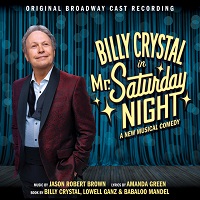 Original Broadway Cast, 2022 (Craft Recordings)
Original Broadway Cast, 2022 (Craft Recordings)  (2 / 5) The highlight of many a Golden Age musicals is the “11 o’clock number.” Mr. Saturday Night, a Golden Age pastiche, has at least four of them — without earning even one. This show was written as a vehicle for Billy Crystal, star of the movie that served as its source material. It tells the story of aging comedian Buddy Young, Jr., who is reduced to playing nursing homes until an “in memoriam” section of an awards show lists him as dead and inspires a career renaissance. This is a character we’re supposed to fall in love with, but lyricist Amanda Green (here writing in the style of her father Adolph) and composer Jason Robert Brown make it hard to do so. Right from his first song, “A Little Joy,” it’s clear that Buddy is a bitter, nasty man — beaten down by bad breaks, sure, but spiteful, and funny only in his anger. Shoshana Bean as his recovering alcoholic daughter expresses her frustration with him in the show’s third song, “There’s A Chance,” compounding the case against him. The essential problem here is that nothing about Buddy redeems him — at least, nothing that’s expressed on the cast album. That proviso is necessary because some of the funniest moments in the show were contained in the book, co-written by Crystal with Lowell Ganz and Babaloo Mandel. For this reviewer, the highlight was a montage in which Buddy humiliated himself on various game shows, meanwhile endearing himself to the audience. Also, as heard on the album, Mr. Saturday Night can feel disjointed; an unexpectedly long flashback sequence (which, due to a lack of interstitial dialogue on the recording, may not even be obvious as a flashback to listeners) does include one of the score’s few truly funny songs, “At Farber’s,” but still seems like an excuse to draw out the skimpy plot. Two of the strongest numbers come towards the end: “Broken,” acted beautifully by David Paymer as Buddy’s long-suffering brother, which adds some variety to the overall sound of the score; and “My Wonderful Pain in the Ass,” a genuinely sweet duet between Buddy and his wife, Elaine (Randy Graff), that’s reminiscent of “Do You Love Me?” from Fiddler on the Roof. Overall, though, Shoshana Bean’s songs prove to be the highlights of the show. In the finale, “Stick Around,” Bean as Buddy’s daughter tells the audience to “stick around — though you sometimes may wonder why.” When you’re listening to this recording and the better songs aren’t playing, those words may seem very well chosen. — Charles Kirsch
(2 / 5) The highlight of many a Golden Age musicals is the “11 o’clock number.” Mr. Saturday Night, a Golden Age pastiche, has at least four of them — without earning even one. This show was written as a vehicle for Billy Crystal, star of the movie that served as its source material. It tells the story of aging comedian Buddy Young, Jr., who is reduced to playing nursing homes until an “in memoriam” section of an awards show lists him as dead and inspires a career renaissance. This is a character we’re supposed to fall in love with, but lyricist Amanda Green (here writing in the style of her father Adolph) and composer Jason Robert Brown make it hard to do so. Right from his first song, “A Little Joy,” it’s clear that Buddy is a bitter, nasty man — beaten down by bad breaks, sure, but spiteful, and funny only in his anger. Shoshana Bean as his recovering alcoholic daughter expresses her frustration with him in the show’s third song, “There’s A Chance,” compounding the case against him. The essential problem here is that nothing about Buddy redeems him — at least, nothing that’s expressed on the cast album. That proviso is necessary because some of the funniest moments in the show were contained in the book, co-written by Crystal with Lowell Ganz and Babaloo Mandel. For this reviewer, the highlight was a montage in which Buddy humiliated himself on various game shows, meanwhile endearing himself to the audience. Also, as heard on the album, Mr. Saturday Night can feel disjointed; an unexpectedly long flashback sequence (which, due to a lack of interstitial dialogue on the recording, may not even be obvious as a flashback to listeners) does include one of the score’s few truly funny songs, “At Farber’s,” but still seems like an excuse to draw out the skimpy plot. Two of the strongest numbers come towards the end: “Broken,” acted beautifully by David Paymer as Buddy’s long-suffering brother, which adds some variety to the overall sound of the score; and “My Wonderful Pain in the Ass,” a genuinely sweet duet between Buddy and his wife, Elaine (Randy Graff), that’s reminiscent of “Do You Love Me?” from Fiddler on the Roof. Overall, though, Shoshana Bean’s songs prove to be the highlights of the show. In the finale, “Stick Around,” Bean as Buddy’s daughter tells the audience to “stick around — though you sometimes may wonder why.” When you’re listening to this recording and the better songs aren’t playing, those words may seem very well chosen. — Charles KirschBusker Alley
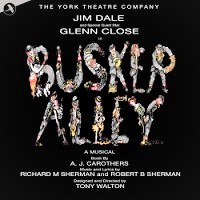 Studio Cast, 2007 (JAY)
Studio Cast, 2007 (JAY)  (1 / 5) Busker Alley never made it to Broadway, but it sure came close, first with a Tommy Tune-led national tour in 1995 (felled by Tune’s broken foot) and then with the York Theatre Company’s 2006 benefit concert starring Jim Dale (intended for a Broadway transfer that never happened). It’s the latter iteration that’s captured on this recording, including the one-night-only luxury casting of Glenn Close as the grown-up version of Libby, a pickpocket-turned-London busker-turned film star who abandons her lover and fellow street performer Charlie Baxter (Dale) in exchange for fame and fortune. Close introduces Charlie’s story in a spoken prologue and then returns at the end to sing, quite beautifully, “He Had A Way,” the gentle highlight of the album. Given the subject matter, many of the songs by the Sherman brothers (Mary Poppins, Over Here, etc.) are cloying street numbers, diegetic to the buskers’ world. The cast approaches these tunes with aggressive Cockney accents married to unnecessarily grating vocals meant to demonstrate, apparently, that these are resilient paupers down on their luck. Dale is fine, if ill-served by thin material, and he’s in his prime when farthest removed from the abiding, overzealous performance style, as in an angry reprise of the ballad “How Long Have I Loved Libby?” and in the short, sweet “Charlie the Busker.” As the younger Libby, Jessica Grové offers an endearing “He Has A Way,” but her Eliza Doolittle drawl is unsubtly distracting. Brevity here is not necessarily the soul of either wit or rich character development, and many of the songs are so brisk that it’s hard to glean much of a dramatic through-line. The street numbers also quickly become indistinguishable from one another (only the lively “Paddle Your Own Canoe” stands out), not helped by the repetitive arrangements for piano and drums. For the completist, it’s nice to have this score recorded, but this album doesn’t make a convincing case that the disappearance of Busker Alley was any great loss. — Dan Rubins
(1 / 5) Busker Alley never made it to Broadway, but it sure came close, first with a Tommy Tune-led national tour in 1995 (felled by Tune’s broken foot) and then with the York Theatre Company’s 2006 benefit concert starring Jim Dale (intended for a Broadway transfer that never happened). It’s the latter iteration that’s captured on this recording, including the one-night-only luxury casting of Glenn Close as the grown-up version of Libby, a pickpocket-turned-London busker-turned film star who abandons her lover and fellow street performer Charlie Baxter (Dale) in exchange for fame and fortune. Close introduces Charlie’s story in a spoken prologue and then returns at the end to sing, quite beautifully, “He Had A Way,” the gentle highlight of the album. Given the subject matter, many of the songs by the Sherman brothers (Mary Poppins, Over Here, etc.) are cloying street numbers, diegetic to the buskers’ world. The cast approaches these tunes with aggressive Cockney accents married to unnecessarily grating vocals meant to demonstrate, apparently, that these are resilient paupers down on their luck. Dale is fine, if ill-served by thin material, and he’s in his prime when farthest removed from the abiding, overzealous performance style, as in an angry reprise of the ballad “How Long Have I Loved Libby?” and in the short, sweet “Charlie the Busker.” As the younger Libby, Jessica Grové offers an endearing “He Has A Way,” but her Eliza Doolittle drawl is unsubtly distracting. Brevity here is not necessarily the soul of either wit or rich character development, and many of the songs are so brisk that it’s hard to glean much of a dramatic through-line. The street numbers also quickly become indistinguishable from one another (only the lively “Paddle Your Own Canoe” stands out), not helped by the repetitive arrangements for piano and drums. For the completist, it’s nice to have this score recorded, but this album doesn’t make a convincing case that the disappearance of Busker Alley was any great loss. — Dan Rubins
The Visitor
 Original Off-Broadway Cast, 2022 (Craft Recordings)
Original Off-Broadway Cast, 2022 (Craft Recordings)  (2 / 5) “A few djembe lessons and like that I am enlightened,” sings Walter (David Hyde Pierce), a grumpy economics professor who learns to play percussion — and finds out all about America’s cruel immigration policies — from an undocumented Syrian immigrant named Tarek (Ahmad Maksoud), who has been squatting with his girlfriend, Zainab (Alysha Deslorieux), in Walter’s vacant apartment. The cast album of The Visitor, in the absence of Kwame Kwei-Armah and Brian Yorkey’s squirmy book, does a better job than the show did onstage of distracting from the story’s troubling focus on how the suffering of a family in the clutches of the immigration system reanimates a middle-aged white guy, but there’s still that uncomfortable undercurrent. This is a Tom Kitt score, so the vocal arrangements are reliably superb, and Kitt creates some riveting grooves, enhanced by the orchestrations of Jamshied Sharifi (The Band’s Visit). The score cleverly suggests the way that music is all around us — hear, for example, the rhythmic shushing and rustling of papers in the song “In The Middle of The Middle Row” — all of which works effectively on the recording. But there’s little subtlety or sensitivity in Yorkey’s lyrics, as when Zainab describes her harrowing journey to the U.S., in ungraceful phrases such as: “But the price of the voyage was steep/They would touch me when I was asleep.” Thankfully, though, Deslorieux is marvelous. Her impassioned “Zainab’s Apology” and an undulating duet for Zainab and Tarek, “My Love Is Free,” merit multiple listens. Hyde Pierce also gives a moving, committed performance, even if his songs become progressively worse as Walter sheds his misanthropy. (“Better Angels” is a particularly cringe-inducing anthem bellowed at uncaring ICE agents.) He does his loveliest work, alongside Jacqueline Antamarian as Tarek’s fraught mother, in the unassuming “What Little I Can Do.” This album can’t redeem a deeply flawed musical, but the strong singing and engaging arrangements make this a score worth a listen. — Dan Rubins
(2 / 5) “A few djembe lessons and like that I am enlightened,” sings Walter (David Hyde Pierce), a grumpy economics professor who learns to play percussion — and finds out all about America’s cruel immigration policies — from an undocumented Syrian immigrant named Tarek (Ahmad Maksoud), who has been squatting with his girlfriend, Zainab (Alysha Deslorieux), in Walter’s vacant apartment. The cast album of The Visitor, in the absence of Kwame Kwei-Armah and Brian Yorkey’s squirmy book, does a better job than the show did onstage of distracting from the story’s troubling focus on how the suffering of a family in the clutches of the immigration system reanimates a middle-aged white guy, but there’s still that uncomfortable undercurrent. This is a Tom Kitt score, so the vocal arrangements are reliably superb, and Kitt creates some riveting grooves, enhanced by the orchestrations of Jamshied Sharifi (The Band’s Visit). The score cleverly suggests the way that music is all around us — hear, for example, the rhythmic shushing and rustling of papers in the song “In The Middle of The Middle Row” — all of which works effectively on the recording. But there’s little subtlety or sensitivity in Yorkey’s lyrics, as when Zainab describes her harrowing journey to the U.S., in ungraceful phrases such as: “But the price of the voyage was steep/They would touch me when I was asleep.” Thankfully, though, Deslorieux is marvelous. Her impassioned “Zainab’s Apology” and an undulating duet for Zainab and Tarek, “My Love Is Free,” merit multiple listens. Hyde Pierce also gives a moving, committed performance, even if his songs become progressively worse as Walter sheds his misanthropy. (“Better Angels” is a particularly cringe-inducing anthem bellowed at uncaring ICE agents.) He does his loveliest work, alongside Jacqueline Antamarian as Tarek’s fraught mother, in the unassuming “What Little I Can Do.” This album can’t redeem a deeply flawed musical, but the strong singing and engaging arrangements make this a score worth a listen. — Dan Rubins
Flying Over Sunset
 Original Broadway Cast, 2022 (Masterworks Broadway)
Original Broadway Cast, 2022 (Masterworks Broadway)  (2 / 5) One thing that can be said for Flying Over Sunset is that it’s certainly ambitious. Conceived and directed by James Lapine, the musical tells of a fictional meeting between movie star Cary Grant (Tony Yazbeck), novelist/philosopher Aldous Huxley (Henry Hadden-Paton), and playwright/politician Clare Boothe Luce (Carmen Cusack), during which the three experiment with the psychological benefits and detriments of LSD — something all three did in real life, but separately. In an effort to theatricalize the effects of the drug and its ability to remove its revelers from reality, all of the songs in this show occur during the characters’ hallucinations. While this allows composer Tom Kitt to create lush compositions, elegantly orchestrated by Michael Starobin, the score only succeeds intermittently. As was the case with her turn in Bright Star, Cusack is once again here given the best material, and she elevates it with her vocal luster and nuanced acting. The ultimate highlight of the recording is the title number, sung during Luce’s first LSD trip as she hallucinates and harmonizes with her deceased mother and daughter. Other elements of the score, however, are just odd. Songs like “Rocket Ship” and “Three Englishmen,” though well performed by Yazbeck, Hadden-Paton, and Robert Sella (as the group’s LSD guru), may prompt one to question whether some of the content of this show is intended to be camp. Listening to Flying Over Sunset, musical theater fans will learn, along with the show’s trio, that for every beautiful high there’s usually a disorienting low. — Matt Koplik
(2 / 5) One thing that can be said for Flying Over Sunset is that it’s certainly ambitious. Conceived and directed by James Lapine, the musical tells of a fictional meeting between movie star Cary Grant (Tony Yazbeck), novelist/philosopher Aldous Huxley (Henry Hadden-Paton), and playwright/politician Clare Boothe Luce (Carmen Cusack), during which the three experiment with the psychological benefits and detriments of LSD — something all three did in real life, but separately. In an effort to theatricalize the effects of the drug and its ability to remove its revelers from reality, all of the songs in this show occur during the characters’ hallucinations. While this allows composer Tom Kitt to create lush compositions, elegantly orchestrated by Michael Starobin, the score only succeeds intermittently. As was the case with her turn in Bright Star, Cusack is once again here given the best material, and she elevates it with her vocal luster and nuanced acting. The ultimate highlight of the recording is the title number, sung during Luce’s first LSD trip as she hallucinates and harmonizes with her deceased mother and daughter. Other elements of the score, however, are just odd. Songs like “Rocket Ship” and “Three Englishmen,” though well performed by Yazbeck, Hadden-Paton, and Robert Sella (as the group’s LSD guru), may prompt one to question whether some of the content of this show is intended to be camp. Listening to Flying Over Sunset, musical theater fans will learn, along with the show’s trio, that for every beautiful high there’s usually a disorienting low. — Matt Koplik
All in Love
 Original Off-Broadway Cast, 1961 (Mercury/Stage Door)
Original Off-Broadway Cast, 1961 (Mercury/Stage Door)  (2 / 5) With its lithe but insubstantial score, preserved nearly complete on the cast album, All In Love turned Richard Brinsley Sheridan’s classic farce The Rivals into a jaunty musical comedy. Featuring music by Jacques Urbont and lyrics by Bruce Geller, the show ran Off-Broadway briefly in 1961, though the album cover misleadingly declares that it was a “Broadway Hit Show.” The plot: Wealthy Captain Jack Absolute (David Atkinson) must disguise himself in pursuing Lydia Languish (Gaylea Byrne) because she desperately wants to marry a poor man. (“He can’t be all bad if he’s good and poor,” she sings in the opening number.) Urbont’s melodies are solidly good-natured but unmemorable throughout; the best of them include Atkinson’s ballad “I Love A Fool” (in which Jack praises Lydia’s “refined imbecility”) and the chipper “I Found Him,” sung by Christina Gillespie as the enamored servant Lucy. The composer ventures towards harmonic ambition only in “Why Wives?,” a vocally intricate but thematically dubious ensemble piece in which the men air their frustrations with monogamy. Geller’s lyrics could be wittier, but his love songs aren’t bad. For example, at one point Lucy exclaims: “I want everyone to know/That, just a miracle ago, I found him.” Lee Cass stands out among the singers, showing off his exquisite bass timbre in “The Lady Was Made To Be Loved.” The Rivals is now probably best known for introducing the character Mrs. Malaprop, Lydia’s twisty-tongued aunt; Mimi Randolph in that role delivers an appropriately silly number, “A More Than Ordinary Glorious Vocabulary,” in which she drops such jumbled wisdom as “Men are never contraceptive to a well-turned phrase.” All in Love is notable for the involvement of actor Dom DeLuise, who appeared in this show three years before his film debut, and orchestrator Jonathan Tunick. DeLuise’s only major moment on the album comes when he leads “Odds,” a goofy, disposable novelty number about cursing. But Tunick’s work glows throughout, emulating the best of his Golden Age forebears in using a large orchestral palette while en route to his game-changing collaborations with Burt Bacharach and Stephen Sondheim — Dan Rubins
(2 / 5) With its lithe but insubstantial score, preserved nearly complete on the cast album, All In Love turned Richard Brinsley Sheridan’s classic farce The Rivals into a jaunty musical comedy. Featuring music by Jacques Urbont and lyrics by Bruce Geller, the show ran Off-Broadway briefly in 1961, though the album cover misleadingly declares that it was a “Broadway Hit Show.” The plot: Wealthy Captain Jack Absolute (David Atkinson) must disguise himself in pursuing Lydia Languish (Gaylea Byrne) because she desperately wants to marry a poor man. (“He can’t be all bad if he’s good and poor,” she sings in the opening number.) Urbont’s melodies are solidly good-natured but unmemorable throughout; the best of them include Atkinson’s ballad “I Love A Fool” (in which Jack praises Lydia’s “refined imbecility”) and the chipper “I Found Him,” sung by Christina Gillespie as the enamored servant Lucy. The composer ventures towards harmonic ambition only in “Why Wives?,” a vocally intricate but thematically dubious ensemble piece in which the men air their frustrations with monogamy. Geller’s lyrics could be wittier, but his love songs aren’t bad. For example, at one point Lucy exclaims: “I want everyone to know/That, just a miracle ago, I found him.” Lee Cass stands out among the singers, showing off his exquisite bass timbre in “The Lady Was Made To Be Loved.” The Rivals is now probably best known for introducing the character Mrs. Malaprop, Lydia’s twisty-tongued aunt; Mimi Randolph in that role delivers an appropriately silly number, “A More Than Ordinary Glorious Vocabulary,” in which she drops such jumbled wisdom as “Men are never contraceptive to a well-turned phrase.” All in Love is notable for the involvement of actor Dom DeLuise, who appeared in this show three years before his film debut, and orchestrator Jonathan Tunick. DeLuise’s only major moment on the album comes when he leads “Odds,” a goofy, disposable novelty number about cursing. But Tunick’s work glows throughout, emulating the best of his Golden Age forebears in using a large orchestral palette while en route to his game-changing collaborations with Burt Bacharach and Stephen Sondheim — Dan Rubins
Mrs. Doubtfire
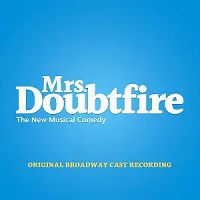 Original Broadway Cast, 2022 (Sh-K-Boom)
Original Broadway Cast, 2022 (Sh-K-Boom)  (2 / 5) A 1993 film comedy in which Robin Williams as divorced dad Daniel cons his way back into his children’s lives by disguising himself as a Scottish nanny, Mrs. Doubtfire seemed to have the bones for a delightful stage musical adaptation. But despite some spunky performances and Ethan Popp’s lively orchestrations, the cast album basically distills what was disappointing about the final product that audiences saw onstage when the show, with a score by Wayne and Karey Kirkpatrick, finally opened on Broadway in 2021 after a long pandemic delay. While the Kirkpatricks’ first show, Something Rotten, grounded its playful musical vernacular in references to the Broadway catalog and, occasionally, the Renaissance, Mrs. Doubtfire’s score stylistically hopscotches from rock to jazz to flamenco without much sense of dramatic purpose or consistent tone. Leading the cast, Rob McClure and Jenn Gambatese are too often hampered by sleepy, self-serious ballads (“I Want To Be There,” “Let Go”) that contain watery platitudes such as “Time can heal, all is not lost / As long as there is love.” The extended production numbers, which seemed designed to pad out the show’s runtime on Broadway — including “Make Me A Woman” (the makeover), “Easy Peasy” (a cooking tutorial), and “You’ve Been Playing With Fire” (a dream sequence, featuring pyrotechnic vocals from Charity Angél Dawson) — feel even less necessary when stripped of their staging. One exception is a comic confrontation (“Big Fat No”) between McClure as Mrs. D. and Mark Evans as the doting gym rat who’s courting Daniel’s ex; the pseudo-bossa-nova groove of this number is appealingly silly, there are some clever tongue-in-cheek ensemble asides, and it’s pretty much the only sequence where McClure actually gets to sing as Mrs. Doubtfire rather than as Daniel. The best song in the score goes to the kids: “What the Hell,” a punchy pop dissection of the impact of divorce, spotlights Avery Sell and Jake Ryan Flynn as Daniel’s youngest children. But it’s the sardonic, aching voice of Analise Scarpaci, playing the eldest daughter, Lydia, that soars highest on this recording. Scarpaci imbues Lydia with an emotional intelligence that lends much-needed specificity to the opening number, “What’s Wrong With This Picture,” and a gloopy second-act duet with McClure, “Just Pretend.” [Note: As it happens, Scarpaci released her own album of original music, Pathetic Little Dreamer, in 2021 while waiting for Mrs Doubtfire to reopen. She’s even better served by her own writing. ] — Dan Rubins
(2 / 5) A 1993 film comedy in which Robin Williams as divorced dad Daniel cons his way back into his children’s lives by disguising himself as a Scottish nanny, Mrs. Doubtfire seemed to have the bones for a delightful stage musical adaptation. But despite some spunky performances and Ethan Popp’s lively orchestrations, the cast album basically distills what was disappointing about the final product that audiences saw onstage when the show, with a score by Wayne and Karey Kirkpatrick, finally opened on Broadway in 2021 after a long pandemic delay. While the Kirkpatricks’ first show, Something Rotten, grounded its playful musical vernacular in references to the Broadway catalog and, occasionally, the Renaissance, Mrs. Doubtfire’s score stylistically hopscotches from rock to jazz to flamenco without much sense of dramatic purpose or consistent tone. Leading the cast, Rob McClure and Jenn Gambatese are too often hampered by sleepy, self-serious ballads (“I Want To Be There,” “Let Go”) that contain watery platitudes such as “Time can heal, all is not lost / As long as there is love.” The extended production numbers, which seemed designed to pad out the show’s runtime on Broadway — including “Make Me A Woman” (the makeover), “Easy Peasy” (a cooking tutorial), and “You’ve Been Playing With Fire” (a dream sequence, featuring pyrotechnic vocals from Charity Angél Dawson) — feel even less necessary when stripped of their staging. One exception is a comic confrontation (“Big Fat No”) between McClure as Mrs. D. and Mark Evans as the doting gym rat who’s courting Daniel’s ex; the pseudo-bossa-nova groove of this number is appealingly silly, there are some clever tongue-in-cheek ensemble asides, and it’s pretty much the only sequence where McClure actually gets to sing as Mrs. Doubtfire rather than as Daniel. The best song in the score goes to the kids: “What the Hell,” a punchy pop dissection of the impact of divorce, spotlights Avery Sell and Jake Ryan Flynn as Daniel’s youngest children. But it’s the sardonic, aching voice of Analise Scarpaci, playing the eldest daughter, Lydia, that soars highest on this recording. Scarpaci imbues Lydia with an emotional intelligence that lends much-needed specificity to the opening number, “What’s Wrong With This Picture,” and a gloopy second-act duet with McClure, “Just Pretend.” [Note: As it happens, Scarpaci released her own album of original music, Pathetic Little Dreamer, in 2021 while waiting for Mrs Doubtfire to reopen. She’s even better served by her own writing. ] — Dan RubinsA Beautiful Noise
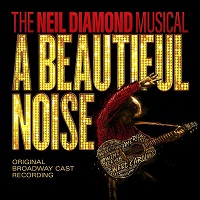 Original Broadway Cast, 2023 (UMe)
Original Broadway Cast, 2023 (UMe)  (3 / 5) This recording differs from the cast albums of many other jukebox musicals, including biomusicals such as Jersey Boys and Beautiful, in that the arrangements and orchestrations here are not close copies of those heard in these songs as originally written and recorded — in this case by Neil Diamond, the subject of this show. A Beautiful Noise exhibits more creativity in that regard, with fresh arrangements (by Sonny Paladino) and orchestrations (by Brian Usifer, Bob Gaudio, and Paladino) that recall the originals just closely enough to keep Diamond fans happy without sounding like carbon copies of the old charts. There’s also a delightful “Opening Montage” featuring snippets of a large handful of Diamond hits in piquant choral arrangements for the ensemble. Another plus for the album is the stellar work of Will Swenson, who somehow manages to very credibly channel Neil Diamond’s husky rock baritone in such hits as “Sweet Caroline,” “Cracklin’ Rosie,” “Love on The Rocks,” etc., etc., even though the natural timbre of Swenson’s singing voice as heard in other shows and on other recordings is considerably lighter and higher. A persuasive argument for experiencing this show through the cast album, rather than actually attending a performance on Broadway, is that the audio-only option means you don’t have to suffer through the sometimes ridiculous setups for these pop songs as they have been placed within the book that Anthony McCarten has written around them — none more egregious than the setup for “You Don’t Bring Me Flowers,” here presented as a bittersweet farewell sung by Neil and his second wife, Marcia Murphey (Robyn Hurder), even though the lyrics have nothing to do with the issues that actually broke up their marriage. Recorded with no dialogue introduction whatsoever, this song may be thoroughly enjoyed out of context, along with all the rest on the album. — Michael Portantiere
(3 / 5) This recording differs from the cast albums of many other jukebox musicals, including biomusicals such as Jersey Boys and Beautiful, in that the arrangements and orchestrations here are not close copies of those heard in these songs as originally written and recorded — in this case by Neil Diamond, the subject of this show. A Beautiful Noise exhibits more creativity in that regard, with fresh arrangements (by Sonny Paladino) and orchestrations (by Brian Usifer, Bob Gaudio, and Paladino) that recall the originals just closely enough to keep Diamond fans happy without sounding like carbon copies of the old charts. There’s also a delightful “Opening Montage” featuring snippets of a large handful of Diamond hits in piquant choral arrangements for the ensemble. Another plus for the album is the stellar work of Will Swenson, who somehow manages to very credibly channel Neil Diamond’s husky rock baritone in such hits as “Sweet Caroline,” “Cracklin’ Rosie,” “Love on The Rocks,” etc., etc., even though the natural timbre of Swenson’s singing voice as heard in other shows and on other recordings is considerably lighter and higher. A persuasive argument for experiencing this show through the cast album, rather than actually attending a performance on Broadway, is that the audio-only option means you don’t have to suffer through the sometimes ridiculous setups for these pop songs as they have been placed within the book that Anthony McCarten has written around them — none more egregious than the setup for “You Don’t Bring Me Flowers,” here presented as a bittersweet farewell sung by Neil and his second wife, Marcia Murphey (Robyn Hurder), even though the lyrics have nothing to do with the issues that actually broke up their marriage. Recorded with no dialogue introduction whatsoever, this song may be thoroughly enjoyed out of context, along with all the rest on the album. — Michael Portantiere
& Juliet
 Original London Cast, 2019
Original London Cast, 2019  (3 / 5) & Juliet is, yes, another musical twist on Shakespeare, but one that’s worthy of joining the large canon that already includes such shows as Kiss Me, Kate, West Side Story, Your Own Thing, and Two Gentlemen of Verona. The plot revolves around Shakespeare’s wife Anne Hathaway -– an annoyingly affected Cassidy Janson on this recording — trying to convince her begrudging husband, suavely sung by Oliver Tompsett, to change the ending of his new play, Romeo & Juliet, to let the leading lady live and reclaim her power. The story is told in a very modern way by using the music of pop songwriter Max Martin, who has penned hits for Britney Spears, Katy Perry, Taylor Swift, et al. These songs fit very smoothly into the plot but, of course, you won’t get much of a sense of that from the cast album. On that note, any recording of a jukebox musical prompts the same question: Without a script attached, is it worth hearing musical theater artists perform pop songs that we already know and love in their original versions? In one case here, at least, the answer is very much “yes”: From the first time we hear Miriam Teak-Lee as Juliet in the album’s third track, “…Baby One More Time,” to her final, soaring harmonies in “Roar,” it’s clear that she possesses the ability to wrap her voice around the riffs and the admittedly 1D emotions of these songs. Other performers, especially the butter-voiced Jordan Luke Gage as Romeo, do well also, though the comically exaggerated performances of Melanie LaBarrie as the Nurse and David Bedella as Lance De Bois, the strict father of Juliet’s new love interest, seem to have gotten a bit lost in translation to the medium of an audio recording. A bonus cover of “One More Try” by Jessie J accents the disparity between pop and theater voices that only Teak-Lee bridges with complete success. If this cast album can’t offer a good picture of the wit, the positive themes, or the spectacle of & Juliet, what it does offer is a veritable candy box of rich orchestrations and strong singers that may leave listeners saying, to quote a song that’s repeated throughout the show, “I want it that way.” — Charles Kirsch
(3 / 5) & Juliet is, yes, another musical twist on Shakespeare, but one that’s worthy of joining the large canon that already includes such shows as Kiss Me, Kate, West Side Story, Your Own Thing, and Two Gentlemen of Verona. The plot revolves around Shakespeare’s wife Anne Hathaway -– an annoyingly affected Cassidy Janson on this recording — trying to convince her begrudging husband, suavely sung by Oliver Tompsett, to change the ending of his new play, Romeo & Juliet, to let the leading lady live and reclaim her power. The story is told in a very modern way by using the music of pop songwriter Max Martin, who has penned hits for Britney Spears, Katy Perry, Taylor Swift, et al. These songs fit very smoothly into the plot but, of course, you won’t get much of a sense of that from the cast album. On that note, any recording of a jukebox musical prompts the same question: Without a script attached, is it worth hearing musical theater artists perform pop songs that we already know and love in their original versions? In one case here, at least, the answer is very much “yes”: From the first time we hear Miriam Teak-Lee as Juliet in the album’s third track, “…Baby One More Time,” to her final, soaring harmonies in “Roar,” it’s clear that she possesses the ability to wrap her voice around the riffs and the admittedly 1D emotions of these songs. Other performers, especially the butter-voiced Jordan Luke Gage as Romeo, do well also, though the comically exaggerated performances of Melanie LaBarrie as the Nurse and David Bedella as Lance De Bois, the strict father of Juliet’s new love interest, seem to have gotten a bit lost in translation to the medium of an audio recording. A bonus cover of “One More Try” by Jessie J accents the disparity between pop and theater voices that only Teak-Lee bridges with complete success. If this cast album can’t offer a good picture of the wit, the positive themes, or the spectacle of & Juliet, what it does offer is a veritable candy box of rich orchestrations and strong singers that may leave listeners saying, to quote a song that’s repeated throughout the show, “I want it that way.” — Charles Kirsch
 Original Broadway Cast, 2022 (Atlantic)
Original Broadway Cast, 2022 (Atlantic)  (4 / 5) Other than the accents, the biggest difference between the two recordings of & Juliet is the use of interstitial dialogue on the Broadway album – or, more accurately, the Toronto album, as that’s where this one was recorded pre-Broadway. (Katy Geraghty, who left the show before it arrived at the Stephen Sondheim Theatre, is still credited here in the role of Lucy). The improvement is tangible, as the snippets of the book that are included give us the context in which the hit songs are used and also play up one of the elements that makes the show as a whole so enjoyable: its humor. Pop song lyrics tend to be somewhat banal, a fact that’s unfortunately accented here because of the slightly more subdued tone of this album as compared to the London one. This is partially due to the sound mixing, which makes the voices slightly softer; but also because of the cast, which, to paraphrase a different show, has its aces in very different places. While Lorna Courtney as Juliet is very talented and adds her own, individual spark to the songs, she’s not quite the exploding firecracker that Miriam Teak-Lee is. Instead, Betsy Wolfe as Anne Hathaway becomes the focus of this album; not only is she a splendid singer, she adds a taste of her enormous acting talent in several sections of spoken dialogue, enough to elevate the material. More happy news is that Philippe Arroyo and Justin David Sullivan as the show’s (arguably) central couple, Francois and May, shine brighter than their London counterparts. Since Wolfe, Arroyo, and Sullivan get to sing most of the quieter pop songs in the score, those moments become the highlights of this recording. (That fact does highlight a structural problem with the album: you’ll often hear one bombastic number right after another, followed by a section in which all you get is the characters’ musical thoughts on frustrated love or identity, the most glaring example being the sequence of songs that stretches from “Whataya Want from Me” to “That’s the Way It Is.”) Melanie La Barrie, the only holdover from the London cast, fares better here, giving slightly subtler and more charming renditions of “Domino” and “Fuckin’ Perfect.” Ben Jackson Walker as Romeo is somewhat generic if inoffensive, and Paulo Szot’s out-of-place operatic voice makes the comedy of Lance really pop. While Stark Sands as a comically smug Shakespeare riffs a bit shakily at the start, in the end he gives a perfectly sweet performance. Fittingly, there’s a new pop-star cover for this album: “Since U Been Gone” as sung by Kelly Clarkson (joined by Lorna Courtney). As of this writing, & Juliet seems to have become a hit on Broadway. Since it’s likely to earn a place alongside Jersey Boys and Beautiful among the most successful of the “jukebox musicals,” any theater fan should get to know it now — and they’re advised to use this recording to help. — C.K.
(4 / 5) Other than the accents, the biggest difference between the two recordings of & Juliet is the use of interstitial dialogue on the Broadway album – or, more accurately, the Toronto album, as that’s where this one was recorded pre-Broadway. (Katy Geraghty, who left the show before it arrived at the Stephen Sondheim Theatre, is still credited here in the role of Lucy). The improvement is tangible, as the snippets of the book that are included give us the context in which the hit songs are used and also play up one of the elements that makes the show as a whole so enjoyable: its humor. Pop song lyrics tend to be somewhat banal, a fact that’s unfortunately accented here because of the slightly more subdued tone of this album as compared to the London one. This is partially due to the sound mixing, which makes the voices slightly softer; but also because of the cast, which, to paraphrase a different show, has its aces in very different places. While Lorna Courtney as Juliet is very talented and adds her own, individual spark to the songs, she’s not quite the exploding firecracker that Miriam Teak-Lee is. Instead, Betsy Wolfe as Anne Hathaway becomes the focus of this album; not only is she a splendid singer, she adds a taste of her enormous acting talent in several sections of spoken dialogue, enough to elevate the material. More happy news is that Philippe Arroyo and Justin David Sullivan as the show’s (arguably) central couple, Francois and May, shine brighter than their London counterparts. Since Wolfe, Arroyo, and Sullivan get to sing most of the quieter pop songs in the score, those moments become the highlights of this recording. (That fact does highlight a structural problem with the album: you’ll often hear one bombastic number right after another, followed by a section in which all you get is the characters’ musical thoughts on frustrated love or identity, the most glaring example being the sequence of songs that stretches from “Whataya Want from Me” to “That’s the Way It Is.”) Melanie La Barrie, the only holdover from the London cast, fares better here, giving slightly subtler and more charming renditions of “Domino” and “Fuckin’ Perfect.” Ben Jackson Walker as Romeo is somewhat generic if inoffensive, and Paulo Szot’s out-of-place operatic voice makes the comedy of Lance really pop. While Stark Sands as a comically smug Shakespeare riffs a bit shakily at the start, in the end he gives a perfectly sweet performance. Fittingly, there’s a new pop-star cover for this album: “Since U Been Gone” as sung by Kelly Clarkson (joined by Lorna Courtney). As of this writing, & Juliet seems to have become a hit on Broadway. Since it’s likely to earn a place alongside Jersey Boys and Beautiful among the most successful of the “jukebox musicals,” any theater fan should get to know it now — and they’re advised to use this recording to help. — C.K.
A Strange Loop
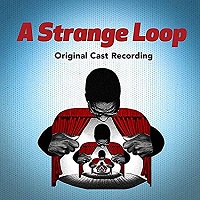 Original Off-Broadway Cast, 2019 (Yellow Sound)
Original Off-Broadway Cast, 2019 (Yellow Sound)  (4 / 5) How to describe A Strange Loop, the Pulitzer-Prize winning musical that gets its title from both a cognitive science term and a Liz Phair song? It’s messy, it’s brilliant, and every theater fan should pay attention to it. Written by Michael R. Jackson, this semi-autobiographical work has no structured plot and is chock-full of content so gleefully explicit, and often discomforting, that it makes shows like Spring Awakening and Book of Mormon look like after-school specials. The show focuses on Usher (Larry Owens), a self-described “fat, black and queer” aspiring musical theater writer who’s working on his newest musical — which also happens to be called “A Strange Loop” and just so happens to be about a fat, black, queer musical theater writer who’s writing a musical about a fat, black, queer musical theater writer. As he struggles with the creative process, Usher wonders if his lack of success as a writer and in acquiring a romantic partner is due to the cruelty and prejudice of the entertainment industry and the world at large, or due to his own trauma and lack of self worth. Jackson uses the musical as a large canvas to explore these and other matters with humor, humanity, and brutal honesty. Songs such as “Exile in Gayville” and “Tyler Perry Writes Real Life” include enough vulgarity and confrontation to put off many listeners, but Jackson’s lyrics are concise, intelligent, and razor-sharp. While his music is not quite so bold, and he sometimes doesn’t end his songs effectively, he has written a melodic, multi-faceted score with tight vocal arrangements (by Jackson) and flexible orchestrations (by Charlie Rosen). The ensemble is made up of Usher’s six main Thoughts, vocalizing his inner demons as well as all of the people in his life — family, agents, even pillars of Black American history. All of the performers heard here as the Thoughts are exceptional, but it’s Owens who commands the recording. His Usher is a ball of flaming, dramatic chaos, thrilling and terrifying. His expressive voice powers through the score, constantly fighting to stay afloat until it softly lands to safety towards the end in “Memory Song.” Owens also turns “Writing a Gospel Play,” in which Usher barely hides his contempt at concocting a script for Tyler Perry, into a comedic tour-de-force. A Strange Loop is not a show or cast album that can be recommended to everyone; it refuses to pander with vague affirmations or self-empowering anthems, and it’s all the more interesting for that reason. — Matt Koplik
(4 / 5) How to describe A Strange Loop, the Pulitzer-Prize winning musical that gets its title from both a cognitive science term and a Liz Phair song? It’s messy, it’s brilliant, and every theater fan should pay attention to it. Written by Michael R. Jackson, this semi-autobiographical work has no structured plot and is chock-full of content so gleefully explicit, and often discomforting, that it makes shows like Spring Awakening and Book of Mormon look like after-school specials. The show focuses on Usher (Larry Owens), a self-described “fat, black and queer” aspiring musical theater writer who’s working on his newest musical — which also happens to be called “A Strange Loop” and just so happens to be about a fat, black, queer musical theater writer who’s writing a musical about a fat, black, queer musical theater writer. As he struggles with the creative process, Usher wonders if his lack of success as a writer and in acquiring a romantic partner is due to the cruelty and prejudice of the entertainment industry and the world at large, or due to his own trauma and lack of self worth. Jackson uses the musical as a large canvas to explore these and other matters with humor, humanity, and brutal honesty. Songs such as “Exile in Gayville” and “Tyler Perry Writes Real Life” include enough vulgarity and confrontation to put off many listeners, but Jackson’s lyrics are concise, intelligent, and razor-sharp. While his music is not quite so bold, and he sometimes doesn’t end his songs effectively, he has written a melodic, multi-faceted score with tight vocal arrangements (by Jackson) and flexible orchestrations (by Charlie Rosen). The ensemble is made up of Usher’s six main Thoughts, vocalizing his inner demons as well as all of the people in his life — family, agents, even pillars of Black American history. All of the performers heard here as the Thoughts are exceptional, but it’s Owens who commands the recording. His Usher is a ball of flaming, dramatic chaos, thrilling and terrifying. His expressive voice powers through the score, constantly fighting to stay afloat until it softly lands to safety towards the end in “Memory Song.” Owens also turns “Writing a Gospel Play,” in which Usher barely hides his contempt at concocting a script for Tyler Perry, into a comedic tour-de-force. A Strange Loop is not a show or cast album that can be recommended to everyone; it refuses to pander with vague affirmations or self-empowering anthems, and it’s all the more interesting for that reason. — Matt Koplik
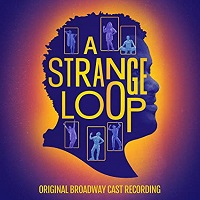 Original Broadway Cast, 2022 (Ghostlight/Yellow Sound)
Original Broadway Cast, 2022 (Ghostlight/Yellow Sound)  (3 / 5) Despite A Strange Loop having had a sold-out run Off-Broadway, winning the Pulitzer Prize, and sweeping all other eligible awards during its season, a transfer to Broadway was not a foregone conclusion. The musical was always going to be a hard sell to a mainstream audience, and the big question for fans of Jackson’s work was: If there is a transfer, will the creative team make any alterations to render the abrasive material more palatable? The answer, as evidenced by this new cast recording, is mostly “no.” A few of the rougher edges have been smoothed over, as in “Inwood Daddy,” but even a slightly toned-down Loop is more shocking and confrontational than 99% of shows that land on Broadway. Some of Jackson’s rewrites make certain lyrics slightly more clear to the audience, though not necessarily easier to take. Where the Broadway transfer and the resulting album lose a great deal of power are in the sound design and the new central performance; the second recording sounds mushier and more echo-y than the first one, making many of the lyrics difficult to decipher, while some of the voices are imbalanced and poorly blended. And although Jaquel Spivey brings pop panache and vocal ease to the role of Usher, his performance is less expressive and explosive than Owens’. This Usher feels more controlled and tempered, which ultimately dilutes the power of the piece. Still, Spivey is vocally well qualified for the role, and some listeners might prefer him to Owens in that regard. A Strange Loop went on to garner more critical acclaim for its Broadway bow, winning the Tony for Best Musical in 2022, though it has continued to struggle at the box office even after earning that honor. This recording is a strong representation of why the show deserves its accolades, even as it also displays what was lost in the move to Broadway. — M.K.
(3 / 5) Despite A Strange Loop having had a sold-out run Off-Broadway, winning the Pulitzer Prize, and sweeping all other eligible awards during its season, a transfer to Broadway was not a foregone conclusion. The musical was always going to be a hard sell to a mainstream audience, and the big question for fans of Jackson’s work was: If there is a transfer, will the creative team make any alterations to render the abrasive material more palatable? The answer, as evidenced by this new cast recording, is mostly “no.” A few of the rougher edges have been smoothed over, as in “Inwood Daddy,” but even a slightly toned-down Loop is more shocking and confrontational than 99% of shows that land on Broadway. Some of Jackson’s rewrites make certain lyrics slightly more clear to the audience, though not necessarily easier to take. Where the Broadway transfer and the resulting album lose a great deal of power are in the sound design and the new central performance; the second recording sounds mushier and more echo-y than the first one, making many of the lyrics difficult to decipher, while some of the voices are imbalanced and poorly blended. And although Jaquel Spivey brings pop panache and vocal ease to the role of Usher, his performance is less expressive and explosive than Owens’. This Usher feels more controlled and tempered, which ultimately dilutes the power of the piece. Still, Spivey is vocally well qualified for the role, and some listeners might prefer him to Owens in that regard. A Strange Loop went on to garner more critical acclaim for its Broadway bow, winning the Tony for Best Musical in 2022, though it has continued to struggle at the box office even after earning that honor. This recording is a strong representation of why the show deserves its accolades, even as it also displays what was lost in the move to Broadway. — M.K.
Six
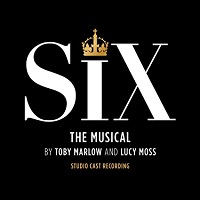 Studio Cast, 2019 (Absolute)
Studio Cast, 2019 (Absolute)  (3 / 5) Part history lesson, part Coachella, SIX gives cheeky insight into the lives of the six wives of Henry VIII in the form of a concert, with the women performing as a pop girl group and each one getting a song to represent herself to the audience. The musical has no concrete plot. Instead, as conceived by writers Toby Marlow and Lucy Moss, it plays out like a mix tape of various contemporary music genres; each wife has a song that tells her story, plus there’s an opening number (“Ex-Wives”) and a finale (“Six”) that thematically connects them all. When this concept recording was released online, it garnered a large fan following and prompted multiple productions of the show around the world. Because the concept album is designed to sound like a traditional pop/R&B album rather than a cast recording, some listeners may be turned off by the over-produced sound mixing and the breathy affectations of several of the vocalists. But don’t be disillusioned by the sheen of this pop presentation: SIX is a strong musical theater score. Marlow and Moss’ lyrics are creative and clever, and their songs naturally channel modern-day pop, a genre that has largely eluded Broadway composers until now. For example, “Don’t Lose Ur Head” (chronicling the rise and fall of Anne Boleyn) and “All You Wanna Do” (re-claiming the narrative of Katherine Howard) bring to mind the bubble-gum ear worms of Avril Lavigne and Katy Perry, while ballads such as Jane Seymour’s “Heart of Stone” could easily fit into an Adele album. Still, it will be difficult for some to listen to this concept album and be able to embrace SIX as a musical theater score. But there is an alternative… — Matt Koplik
(3 / 5) Part history lesson, part Coachella, SIX gives cheeky insight into the lives of the six wives of Henry VIII in the form of a concert, with the women performing as a pop girl group and each one getting a song to represent herself to the audience. The musical has no concrete plot. Instead, as conceived by writers Toby Marlow and Lucy Moss, it plays out like a mix tape of various contemporary music genres; each wife has a song that tells her story, plus there’s an opening number (“Ex-Wives”) and a finale (“Six”) that thematically connects them all. When this concept recording was released online, it garnered a large fan following and prompted multiple productions of the show around the world. Because the concept album is designed to sound like a traditional pop/R&B album rather than a cast recording, some listeners may be turned off by the over-produced sound mixing and the breathy affectations of several of the vocalists. But don’t be disillusioned by the sheen of this pop presentation: SIX is a strong musical theater score. Marlow and Moss’ lyrics are creative and clever, and their songs naturally channel modern-day pop, a genre that has largely eluded Broadway composers until now. For example, “Don’t Lose Ur Head” (chronicling the rise and fall of Anne Boleyn) and “All You Wanna Do” (re-claiming the narrative of Katherine Howard) bring to mind the bubble-gum ear worms of Avril Lavigne and Katy Perry, while ballads such as Jane Seymour’s “Heart of Stone” could easily fit into an Adele album. Still, it will be difficult for some to listen to this concept album and be able to embrace SIX as a musical theater score. But there is an alternative… — Matt KoplikOriginal Broadway Cast, 2022 (6 Music Ltd.)  (4 / 5) Recorded live on opening night of the Broadway production of SIX, this album captures the show’s fervent energy and the score’s dramatic meat when it’s put in the hands of six smart and talented singing actresses. The crowd’s hyper-energetic response to “Ex-Wives”at the start may be overwhelming or frustrating for some listeners, but given that SIX’s opening was delayed for 18 months due to the COVID-19 pandemic, that response is understandable. Thereafter, the album focuses primarily on the performers, starting with Adrianna Hicks salivating over the Beyonce-inspired “No Way” and moving on non-stop from there. Each singing actress delivers in the pop/R&B style of the score while also infusing these songs with spice and personality. Andrea Masceat fills “Don’t Lose Ur Head” with “Ain’t I a stinker?” attitude, while Abby Mueller communicates pain through each melisma in “Heart of Stone.” Then there’s Brittney Mack delightfully showing off in “Get Down” and Samantha Pauly blending trauma with Ariana Grande-style power belting in “All You Wanna Do,” finally capped by Anna Uzele bringing cool and calm to “I Don’t Need Your Love.” The album includes pieces of dialogue to help string the songs together, and some extra music is included, making this a more complete representation of the score than the studio cast recording. SIX isn’t for everyone, but if you have a friend who’s on the fence about giving Marlow and Moss’ Gen Z song cycle a chance, this is the album to lend them. — M.K.
(4 / 5) Recorded live on opening night of the Broadway production of SIX, this album captures the show’s fervent energy and the score’s dramatic meat when it’s put in the hands of six smart and talented singing actresses. The crowd’s hyper-energetic response to “Ex-Wives”at the start may be overwhelming or frustrating for some listeners, but given that SIX’s opening was delayed for 18 months due to the COVID-19 pandemic, that response is understandable. Thereafter, the album focuses primarily on the performers, starting with Adrianna Hicks salivating over the Beyonce-inspired “No Way” and moving on non-stop from there. Each singing actress delivers in the pop/R&B style of the score while also infusing these songs with spice and personality. Andrea Masceat fills “Don’t Lose Ur Head” with “Ain’t I a stinker?” attitude, while Abby Mueller communicates pain through each melisma in “Heart of Stone.” Then there’s Brittney Mack delightfully showing off in “Get Down” and Samantha Pauly blending trauma with Ariana Grande-style power belting in “All You Wanna Do,” finally capped by Anna Uzele bringing cool and calm to “I Don’t Need Your Love.” The album includes pieces of dialogue to help string the songs together, and some extra music is included, making this a more complete representation of the score than the studio cast recording. SIX isn’t for everyone, but if you have a friend who’s on the fence about giving Marlow and Moss’ Gen Z song cycle a chance, this is the album to lend them. — M.K.
Prince of Egypt
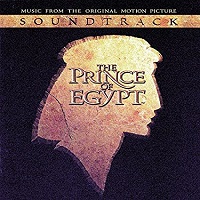 Film Soundtrack, 1998 (Dreamworks)
Film Soundtrack, 1998 (Dreamworks)  (3 / 5) Like several other animated musical classics of the screen, from Snow White to the clutch of far more recent Disney films (The Little Mermaid, Aladdin, Beauty and the Beast, Frozen, Coco, et al.), Prince of Egypt contains considerably fewer songs than would be included in a stage musical. But the songs with music and lyrics by Stephen Schwartz that are heard here, beautifully augmented by Hans Zimmer’s lush orchestral score, make for a thoroughly enjoyable listening experience. Highlights of what is basically an animated musical remake of The Ten Commandments (!!!!) include the powerful opening chorus of the Hebrew Slaves, “Deliver Us”; Moses’ plaintive “All I Ever Wanted,” sung by Amick Byram, with the “Queen’s reprise” delivered equally persuasively by Linda Dee Shayne; a weird, comic-villain number, “Playing with the Big Boys Now,” performed by Steve Martin and Martin Short as two of the Pharoah’s henchmen; the inspirational ballad “Through Heaven’s Eyes,” which allows us to revel in the wonderful Broadway baritone of Brian Stokes Mitchell; and the lovely duet “When You Believe,” prettily sung in pseudo pop-style by Michelle Pfeiffer and Sally Dworsky, with the bonus of a full-on pop version by Mariah Carey and Whitney Houston. — Michael Portantiere
(3 / 5) Like several other animated musical classics of the screen, from Snow White to the clutch of far more recent Disney films (The Little Mermaid, Aladdin, Beauty and the Beast, Frozen, Coco, et al.), Prince of Egypt contains considerably fewer songs than would be included in a stage musical. But the songs with music and lyrics by Stephen Schwartz that are heard here, beautifully augmented by Hans Zimmer’s lush orchestral score, make for a thoroughly enjoyable listening experience. Highlights of what is basically an animated musical remake of The Ten Commandments (!!!!) include the powerful opening chorus of the Hebrew Slaves, “Deliver Us”; Moses’ plaintive “All I Ever Wanted,” sung by Amick Byram, with the “Queen’s reprise” delivered equally persuasively by Linda Dee Shayne; a weird, comic-villain number, “Playing with the Big Boys Now,” performed by Steve Martin and Martin Short as two of the Pharoah’s henchmen; the inspirational ballad “Through Heaven’s Eyes,” which allows us to revel in the wonderful Broadway baritone of Brian Stokes Mitchell; and the lovely duet “When You Believe,” prettily sung in pseudo pop-style by Michelle Pfeiffer and Sally Dworsky, with the bonus of a full-on pop version by Mariah Carey and Whitney Houston. — Michael Portantiere
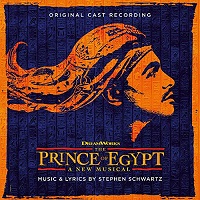 Original London Cast, 2020 (Ghostlight)
Original London Cast, 2020 (Ghostlight)  (3 / 5) Unsurprisingly, no music by Hans Zimmer is to be heard in this stage adaptation of Prince of Egypt, but Stephen Schwartz augmented the film’s song stack to create a full-fledged stage musical that made its debut at TheatreWorks Silicon Valley at the Mountain View Center for the Performing Arts in 2017, then had its international premiere in a Danish production at the Fredericia Teater in April 2018, followed by a summer run at the Royal Danish Theatre in Copenhagen and a presentation at the Tuacahn Amphitheatre in Ivins, Utah. A revised version opened at the Dominion Theatre in London’s West End on February 2020 and, after closing in March of that year due to the COVID-19 pandemic, reopened on July 1, 2021. “Playing With the Big Boys Now” was eliminated from the show score early on (probably for the best), but as noted, many new songs were added, resulting in a cast album that’s full to bursting with 23 tracks (including three reprises). “Deliver Us” makes for a thrilling opening sequence, and the other items retained from the film (“All I Ever Wanted,” “Through Heaven’s Eyes,” “When You Believe”) work equally well as stage musical numbers. Among the major new additions are songs titled “Faster,” “One Weak Link,” “Footprints on the Sand,” “Make it Right,” “Never in a Million Years,” “Always on Your Side,” and “For The Rest of My Life.” If none of these represent Schwartz’s top-shelf work, they are all worthy efforts by one of the musical theater’s greatest composer/lyricists, performed by a strong cast headed by Luke Brady (Moses), Liam Tamne (Ramses), Christine Allado (Tzipporah), Alexia Khadime (Miriam), Joe Dixon (Seti), Debbie Kurup (Queen Tuya), Gary Wilmot (Jethro), Mercedesz Csampai (Yocheved), Adam Pearce (Hotep), Tanisha Spring (Nefertari), and Silas Wyatt-Barke (Aaron). — M.P.
(3 / 5) Unsurprisingly, no music by Hans Zimmer is to be heard in this stage adaptation of Prince of Egypt, but Stephen Schwartz augmented the film’s song stack to create a full-fledged stage musical that made its debut at TheatreWorks Silicon Valley at the Mountain View Center for the Performing Arts in 2017, then had its international premiere in a Danish production at the Fredericia Teater in April 2018, followed by a summer run at the Royal Danish Theatre in Copenhagen and a presentation at the Tuacahn Amphitheatre in Ivins, Utah. A revised version opened at the Dominion Theatre in London’s West End on February 2020 and, after closing in March of that year due to the COVID-19 pandemic, reopened on July 1, 2021. “Playing With the Big Boys Now” was eliminated from the show score early on (probably for the best), but as noted, many new songs were added, resulting in a cast album that’s full to bursting with 23 tracks (including three reprises). “Deliver Us” makes for a thrilling opening sequence, and the other items retained from the film (“All I Ever Wanted,” “Through Heaven’s Eyes,” “When You Believe”) work equally well as stage musical numbers. Among the major new additions are songs titled “Faster,” “One Weak Link,” “Footprints on the Sand,” “Make it Right,” “Never in a Million Years,” “Always on Your Side,” and “For The Rest of My Life.” If none of these represent Schwartz’s top-shelf work, they are all worthy efforts by one of the musical theater’s greatest composer/lyricists, performed by a strong cast headed by Luke Brady (Moses), Liam Tamne (Ramses), Christine Allado (Tzipporah), Alexia Khadime (Miriam), Joe Dixon (Seti), Debbie Kurup (Queen Tuya), Gary Wilmot (Jethro), Mercedesz Csampai (Yocheved), Adam Pearce (Hotep), Tanisha Spring (Nefertari), and Silas Wyatt-Barke (Aaron). — M.P.
Anyone Can Whistle
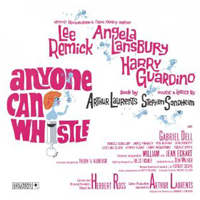 Original Broadway Cast, 1964 (Columbia/Sony)
Original Broadway Cast, 1964 (Columbia/Sony)  (5 / 5) The show was a flop, but virtually every number is a winner, and so is this recording. Broadway audiences were bored by Arthur Laurents’ bizarre, satirical fable in which corrupt, small-town politicians fake a miracle by pumping water out of a rock, thus creating a new Lourdes with its attendant tourist trade. But what a cast! Angela Lansbury launched her musical theater career as Cora Hoover Hooper, the scheming mayor. Her co-stars were Lee Remick as Fay Apple, head nurse in the local nuthouse (named The Cookie Jar!), and Harry Guardino as J. Bowden Hapgood, a phony psychiatrist who stirs up trouble. And what a score! Stephen Sondheim’s wildly inventive songs include a lengthy musical-dramatic sequence, “Simple,” and a campy ballet, “The Cookie Chase.” Lansbury’s opener, “Me and My Town,” is a riotous spoof of nightclub-diva dramatics. Remick gets the achingly beautiful title tune, and Guardino delivers the biting, driving “Everybody Says Don’t.” The final duet for Hapgood and Fay, “With So Little to Be Sure Of,” is one of Sondheim’s finest, most adult love songs. Don Walker’s orchestrations are brassy and delightful. Recorded the day after the show closed, the album has a raw quality — Lansbury, for one, evidences some vocal strain — that, paradoxically, makes it seem fresher than many recordings that are more polished. One of Remick’s numbers, “There Won’t Be Trumpets,” was cut before the show opened and left off the LP, but has been restored for the CD. This kind of “failure” is far more interesting than lots of long-running hits. Note: Look for the version of the cast album marked “Deluxe Expanded Edition.” It includes bonus tracks of Sondheim singing demo versions of, among other things, the cut number “The Lame, the Halt, and the Blind” and an alternate version of “With So Little to Be Sure Of.” — David Barbour
(5 / 5) The show was a flop, but virtually every number is a winner, and so is this recording. Broadway audiences were bored by Arthur Laurents’ bizarre, satirical fable in which corrupt, small-town politicians fake a miracle by pumping water out of a rock, thus creating a new Lourdes with its attendant tourist trade. But what a cast! Angela Lansbury launched her musical theater career as Cora Hoover Hooper, the scheming mayor. Her co-stars were Lee Remick as Fay Apple, head nurse in the local nuthouse (named The Cookie Jar!), and Harry Guardino as J. Bowden Hapgood, a phony psychiatrist who stirs up trouble. And what a score! Stephen Sondheim’s wildly inventive songs include a lengthy musical-dramatic sequence, “Simple,” and a campy ballet, “The Cookie Chase.” Lansbury’s opener, “Me and My Town,” is a riotous spoof of nightclub-diva dramatics. Remick gets the achingly beautiful title tune, and Guardino delivers the biting, driving “Everybody Says Don’t.” The final duet for Hapgood and Fay, “With So Little to Be Sure Of,” is one of Sondheim’s finest, most adult love songs. Don Walker’s orchestrations are brassy and delightful. Recorded the day after the show closed, the album has a raw quality — Lansbury, for one, evidences some vocal strain — that, paradoxically, makes it seem fresher than many recordings that are more polished. One of Remick’s numbers, “There Won’t Be Trumpets,” was cut before the show opened and left off the LP, but has been restored for the CD. This kind of “failure” is far more interesting than lots of long-running hits. Note: Look for the version of the cast album marked “Deluxe Expanded Edition.” It includes bonus tracks of Sondheim singing demo versions of, among other things, the cut number “The Lame, the Halt, and the Blind” and an alternate version of “With So Little to Be Sure Of.” — David Barbour
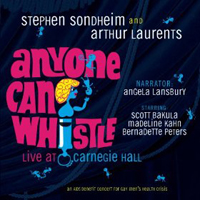 Carnegie Hall Concert Cast, 1995 (Columbia/Sony)
Carnegie Hall Concert Cast, 1995 (Columbia/Sony)  (1 / 5) This live recording of a starry concert version of Anyone Can Whistle, produced as a benefit for Gay Men’s Health Crisis, preserves more of the score than is heard on the original cast album. It includes “There Won’t Be Trumpets” as well as “There’s Always a Woman,” an unpleasant bitch-fest between Cora and Fay that was also cut from the score before the show opened on Broadway. But, 30 years on, nobody can muster much conviction for Laurents’ talky satire. As Cora, Fay, and Hapgood, Madeline Kahn, Bernadette Peters, and Scott Bakula respectively offer tentative, vocally wobbly performances, while Angela Lansbury narrates. Peters manages a lovely version of the title tune but lacks Remick’s vulnerability, and she’s really at a loss in the scenes where Fay impersonates a sexy French temptress. Kahn is the biggest disappointment here, giving a performance that lacks bite or energy. And Bakula doesn’t possess Guardino’s rough authority. What’s especially missed is the urgency of the original album. As sometimes happens in live recordings, the balance between singers and the orchestra is not ideal. Even Don Walker’s orchestrations, supervised by Jonathan Tunick, lose some edge. — D.B.
(1 / 5) This live recording of a starry concert version of Anyone Can Whistle, produced as a benefit for Gay Men’s Health Crisis, preserves more of the score than is heard on the original cast album. It includes “There Won’t Be Trumpets” as well as “There’s Always a Woman,” an unpleasant bitch-fest between Cora and Fay that was also cut from the score before the show opened on Broadway. But, 30 years on, nobody can muster much conviction for Laurents’ talky satire. As Cora, Fay, and Hapgood, Madeline Kahn, Bernadette Peters, and Scott Bakula respectively offer tentative, vocally wobbly performances, while Angela Lansbury narrates. Peters manages a lovely version of the title tune but lacks Remick’s vulnerability, and she’s really at a loss in the scenes where Fay impersonates a sexy French temptress. Kahn is the biggest disappointment here, giving a performance that lacks bite or energy. And Bakula doesn’t possess Guardino’s rough authority. What’s especially missed is the urgency of the original album. As sometimes happens in live recordings, the balance between singers and the orchestra is not ideal. Even Don Walker’s orchestrations, supervised by Jonathan Tunick, lose some edge. — D.B.
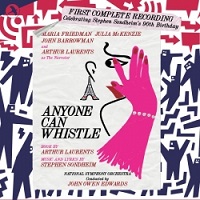 Studio Cast, 1997/2020 (JAY, 2CDs)
Studio Cast, 1997/2020 (JAY, 2CDs)  (2 / 5) Elephants, who take 23 months to gestate, have nothing on this two-disc set, which incubated for 23 years. Recording began, and the bulk of it was completed, in 1997 — several presidential administrations ago. This is one of those JAY efforts billed as complete recordings, including playoffs and curtain call and exit music. Chat room savants insist that certain numbers have been cut slightly, and “There’s Always a Woman” is M.I.A. Nevertheless, this is the fullest recorded edition of Anyone Can Whistle that we are likely to get. Happily preserved are “The Cookie Chase” (in a lengthier version than that contained on the OBCR) and the ballet attached to “Everybody Says Don’t,” one of the jazzier passages in any Sondheim-composed musical. But the overly reverent approach to this score, treating a scrappy, satirical musical like a tony Gesamtkunstwerk, is counterproductive. Of the three stars, Julia McKenzie comes off best, punching her way through “Me and My Town” and “A Parade in Town” with gusto, but, unlike Lansbury, she doesn’t seem to be having fun with Cora’s cartoon-villain qualities. John Barrowman is a disconcertingly boyish Hapgood, which may be why he oversells “Everybody Says Don’t,” shouting every fifth or sixth word of the lyrics to signal his passion. Also problematic is Maria Friedman as Fay — a joyless Joan of Arc, lacking in warmth and applying an unpleasant vibrato to several numbers. Everyone’s line readings are pretty dire; this is a real issue in “Simple,” which weaves together music and dialogue. Conductor John Owen Edwards gets an expansive sound out of the National Symphony Orchestra, not always an asset in a show designed to be a sprightly spoof. It’s a pity that nobody recorded the 2010 New York City Center Encores! production of Anyone Can Whistle, which boasted the nearly ideal cast of Raúl Esparza, Sutton Foster, and Donna Murphy. But if you’re a superfan of the show, you’ll want to hear this recording if only because it does have material not available anywhere else — with Arthur Laurents, sounding like he needs a nap, providing occasional narration — D.B.
(2 / 5) Elephants, who take 23 months to gestate, have nothing on this two-disc set, which incubated for 23 years. Recording began, and the bulk of it was completed, in 1997 — several presidential administrations ago. This is one of those JAY efforts billed as complete recordings, including playoffs and curtain call and exit music. Chat room savants insist that certain numbers have been cut slightly, and “There’s Always a Woman” is M.I.A. Nevertheless, this is the fullest recorded edition of Anyone Can Whistle that we are likely to get. Happily preserved are “The Cookie Chase” (in a lengthier version than that contained on the OBCR) and the ballet attached to “Everybody Says Don’t,” one of the jazzier passages in any Sondheim-composed musical. But the overly reverent approach to this score, treating a scrappy, satirical musical like a tony Gesamtkunstwerk, is counterproductive. Of the three stars, Julia McKenzie comes off best, punching her way through “Me and My Town” and “A Parade in Town” with gusto, but, unlike Lansbury, she doesn’t seem to be having fun with Cora’s cartoon-villain qualities. John Barrowman is a disconcertingly boyish Hapgood, which may be why he oversells “Everybody Says Don’t,” shouting every fifth or sixth word of the lyrics to signal his passion. Also problematic is Maria Friedman as Fay — a joyless Joan of Arc, lacking in warmth and applying an unpleasant vibrato to several numbers. Everyone’s line readings are pretty dire; this is a real issue in “Simple,” which weaves together music and dialogue. Conductor John Owen Edwards gets an expansive sound out of the National Symphony Orchestra, not always an asset in a show designed to be a sprightly spoof. It’s a pity that nobody recorded the 2010 New York City Center Encores! production of Anyone Can Whistle, which boasted the nearly ideal cast of Raúl Esparza, Sutton Foster, and Donna Murphy. But if you’re a superfan of the show, you’ll want to hear this recording if only because it does have material not available anywhere else — with Arthur Laurents, sounding like he needs a nap, providing occasional narration — D.B.
Carrie
 Premiere Cast Recording, 2012 (Ghostlight)
Premiere Cast Recording, 2012 (Ghostlight)  (2 / 5) Based on the supernatural horror novel by Stephen King, which had previously been adapted as a highly successful film in 1976, Carrie is/was one of the most infamous, ignominious flops in musical theater history. After a disastrous tryout run in Stratford-Upon Avon, the show managed only 16 previews and five performances on Broadway in the spring of 1988, yielding no cast album. Many critics and others felt that the work of composer Michael Gore, lyricist Dean Pitchford, and book writer Lawrence D. Cohen was wildly inconsistent in quality, with several riveting moments of confrontation between the bullied, telekinetic teenager Carrie White and her religious zealot mother Margaret playing out powerfully in the midst of risible scenes and songs concerning Carrie’s experiences in high school. Apparently, much of the problem with the production rested in the fact that the American creative team and director Terry Hands of the Royal Shakespeare Company were not on the same page as to what the look, tone, and presentation style of the show should be. But, as noted, there were also huge problems in the writing, leading to major changes for the revisal that was presented Off-Broadway in 2012. The songs “Dream On,” “It Hurts to Be Strong,” “Don’t Waste the Moon,” “Heaven,” “I’m Not Alone,” “Wotta Night,” and the camp classic “Out for Blood” were all dropped, while several new ones were added; two of the best of them are the ballad “Dreamer in Disguise,” sweetly sung by Derek Klena in the role of Tommy Ross, and “Stay Here Instead,” in which Margaret pathetically pleads with her daughter not to go to the prom. (If only she had listened!) But there are still a few mediocre or worse numbers among both the old and new songs, for example, “In” and “A Night We’ll Never Forget.” As was the case with the original version, the score’s musical/dramatic highlights are the unnerving Carrie/Margaret duets “And Eve Was Weak” and “I Remember How Those Boys Could Dance,” and Margaret’s moving solo “When There’s No One.” On the cast album of the 2012 production, these and other songs benefit greatly from the deeply committed performances of Molly Ranson as the tormented Carrie and one of the all-time Broadway greats, Marin Mazzie, as her sadly deranged mother. Rounding out the strong cast are Christy Altomare as Sue, Jeanna de Waal as Chris, Ben Thompson as Billy, Wayne Alan Wilcox as Mr. Stephens, and Carmen Cusack in a wonderfully warm turn as Miss Gardner. — Michael Portantiere
(2 / 5) Based on the supernatural horror novel by Stephen King, which had previously been adapted as a highly successful film in 1976, Carrie is/was one of the most infamous, ignominious flops in musical theater history. After a disastrous tryout run in Stratford-Upon Avon, the show managed only 16 previews and five performances on Broadway in the spring of 1988, yielding no cast album. Many critics and others felt that the work of composer Michael Gore, lyricist Dean Pitchford, and book writer Lawrence D. Cohen was wildly inconsistent in quality, with several riveting moments of confrontation between the bullied, telekinetic teenager Carrie White and her religious zealot mother Margaret playing out powerfully in the midst of risible scenes and songs concerning Carrie’s experiences in high school. Apparently, much of the problem with the production rested in the fact that the American creative team and director Terry Hands of the Royal Shakespeare Company were not on the same page as to what the look, tone, and presentation style of the show should be. But, as noted, there were also huge problems in the writing, leading to major changes for the revisal that was presented Off-Broadway in 2012. The songs “Dream On,” “It Hurts to Be Strong,” “Don’t Waste the Moon,” “Heaven,” “I’m Not Alone,” “Wotta Night,” and the camp classic “Out for Blood” were all dropped, while several new ones were added; two of the best of them are the ballad “Dreamer in Disguise,” sweetly sung by Derek Klena in the role of Tommy Ross, and “Stay Here Instead,” in which Margaret pathetically pleads with her daughter not to go to the prom. (If only she had listened!) But there are still a few mediocre or worse numbers among both the old and new songs, for example, “In” and “A Night We’ll Never Forget.” As was the case with the original version, the score’s musical/dramatic highlights are the unnerving Carrie/Margaret duets “And Eve Was Weak” and “I Remember How Those Boys Could Dance,” and Margaret’s moving solo “When There’s No One.” On the cast album of the 2012 production, these and other songs benefit greatly from the deeply committed performances of Molly Ranson as the tormented Carrie and one of the all-time Broadway greats, Marin Mazzie, as her sadly deranged mother. Rounding out the strong cast are Christy Altomare as Sue, Jeanna de Waal as Chris, Ben Thompson as Billy, Wayne Alan Wilcox as Mr. Stephens, and Carmen Cusack in a wonderfully warm turn as Miss Gardner. — Michael Portantiere
Moulin Rouge!
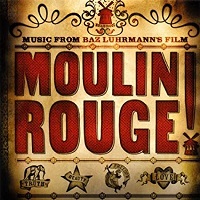 Music From Baz Luhrmann’s Film, 2001 (Interscope)
Music From Baz Luhrmann’s Film, 2001 (Interscope)  (1 / 5) Here is the soundtrack recording (partly; see below) of what might be described as a movie musical that’s perfect for the ADD generation in terms of its plot (based on well-worn tropes from several famous works, most notably the operas La Bohème and La Traviata and their literary source material) as well as its “jukebox” score (an overstuffed basket of pop hits from the last half of the 20th century). Also geared toward those who suffer from attention deficit disorder is the ridiculously frenetic editing of the film as directed by Baz Luhrmann. Presumably, at least some people who enjoyed the musical performances in Moulin Rouge! might wish to own the soundtrack album if only to experience the songs without having to endure the over-editing of the film itself. But caveat emptor, as the album titled Moulin Rouge! Music from Baz Luhrmann’s Film does not, for the most part, feature performances from the movie, instead offering covers of those covers. To cite only one major example, this collection starts with “Nature Boy” sung not by John Leguizamo (who plays Toulouse-Lautrec in the film and sings the song to open it) but instead by David Bowie. A highlight of the album is a performance that is, indeed, heard in the movie: Ewan McGregor’s lovely, romantic rendition of Elton John and Bernie Taupin’s beautiful “Your Song.” But fans of the film who want audio-only versions of the performances in it will need to additionally seek out the album Moulin Rouge! 2, which includes such items as Nicole Kidman’s “Sparkling Diamonds” (a silly mash-up of “Diamonds Are a Girl’s Best Friend” and “Material Girl”); Jim Broadbent, Richard Roxburgh, et al. having their way with “Like a Virgin” (yes, another Madonna song); and the Can-Can pastiche “The Pitch (Spectacular Spectacular).” There are also excerpts from the film’s background score by Craig Armstrong, for anyone who might care a whit about that. – Michael Portantiere
(1 / 5) Here is the soundtrack recording (partly; see below) of what might be described as a movie musical that’s perfect for the ADD generation in terms of its plot (based on well-worn tropes from several famous works, most notably the operas La Bohème and La Traviata and their literary source material) as well as its “jukebox” score (an overstuffed basket of pop hits from the last half of the 20th century). Also geared toward those who suffer from attention deficit disorder is the ridiculously frenetic editing of the film as directed by Baz Luhrmann. Presumably, at least some people who enjoyed the musical performances in Moulin Rouge! might wish to own the soundtrack album if only to experience the songs without having to endure the over-editing of the film itself. But caveat emptor, as the album titled Moulin Rouge! Music from Baz Luhrmann’s Film does not, for the most part, feature performances from the movie, instead offering covers of those covers. To cite only one major example, this collection starts with “Nature Boy” sung not by John Leguizamo (who plays Toulouse-Lautrec in the film and sings the song to open it) but instead by David Bowie. A highlight of the album is a performance that is, indeed, heard in the movie: Ewan McGregor’s lovely, romantic rendition of Elton John and Bernie Taupin’s beautiful “Your Song.” But fans of the film who want audio-only versions of the performances in it will need to additionally seek out the album Moulin Rouge! 2, which includes such items as Nicole Kidman’s “Sparkling Diamonds” (a silly mash-up of “Diamonds Are a Girl’s Best Friend” and “Material Girl”); Jim Broadbent, Richard Roxburgh, et al. having their way with “Like a Virgin” (yes, another Madonna song); and the Can-Can pastiche “The Pitch (Spectacular Spectacular).” There are also excerpts from the film’s background score by Craig Armstrong, for anyone who might care a whit about that. – Michael Portantiere
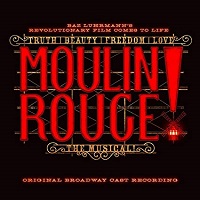 Original Broadway Cast, 2019 (RCA)
Original Broadway Cast, 2019 (RCA)  (1 / 5) People who loved Baz Luhrmann’s Moulin Rouge! on the screen won’t necessarily have similar affection for the Broadway musical based on the movie. There are many differences, including much of the score (songs first made famous by Lady Gaga, Britney Spears, the Eurtyhmics, etc. are now included as others have been jettisoned) and some of the story elements and dialogue. Those who enjoyed the seemingly fueled-by-crack editing of the movie will, of course, miss that element in the stage adaptation, while others who abhorred and deplored all that relentless, insanely quick cutting will appreciate being able to make their own decisions about what to focus on when seeing the show, and for how long. As for the cast recording, at least you’ll know exactly what to expect when/if you get your hands on it: a truckload of pop hits, or fragments of same, performed by Karen Olivo as Satine, Aaron Tveit as Christian, Danny Burstein as Harold Zidler, Robyn Hurder as Nini, Tam Mutu as The Duke of Monroth, Sahr Ngaujah as Toulouse-Lautrec, and the other original cast members who sang them on stage at the Al Hirschfeld Theatre before and, in some cases, after the show was forced to suspend performances due to the COVID-19 crisis of 2020. (Cast album listeners have the additional assurance that they will, indeed, hear Satine’s songs delivered by Olivo, who was frequently absent during the eight months or so that Moulin Rouge! ran prior to its closure at the onset of the pandemic.) Although Tveit tends to come across as bland on stage, his strong, clear, unaffected tenor voice is a pleasure to hear on this album, and Burstein is always a vivid presence. The musical supervisor here is Justin Levine, with Cian McCarthy as conductor and Matt Stine as Music Producer — that last credit an unusual one for a Broadway show, or at least it used to be. – M.P.
(1 / 5) People who loved Baz Luhrmann’s Moulin Rouge! on the screen won’t necessarily have similar affection for the Broadway musical based on the movie. There are many differences, including much of the score (songs first made famous by Lady Gaga, Britney Spears, the Eurtyhmics, etc. are now included as others have been jettisoned) and some of the story elements and dialogue. Those who enjoyed the seemingly fueled-by-crack editing of the movie will, of course, miss that element in the stage adaptation, while others who abhorred and deplored all that relentless, insanely quick cutting will appreciate being able to make their own decisions about what to focus on when seeing the show, and for how long. As for the cast recording, at least you’ll know exactly what to expect when/if you get your hands on it: a truckload of pop hits, or fragments of same, performed by Karen Olivo as Satine, Aaron Tveit as Christian, Danny Burstein as Harold Zidler, Robyn Hurder as Nini, Tam Mutu as The Duke of Monroth, Sahr Ngaujah as Toulouse-Lautrec, and the other original cast members who sang them on stage at the Al Hirschfeld Theatre before and, in some cases, after the show was forced to suspend performances due to the COVID-19 crisis of 2020. (Cast album listeners have the additional assurance that they will, indeed, hear Satine’s songs delivered by Olivo, who was frequently absent during the eight months or so that Moulin Rouge! ran prior to its closure at the onset of the pandemic.) Although Tveit tends to come across as bland on stage, his strong, clear, unaffected tenor voice is a pleasure to hear on this album, and Burstein is always a vivid presence. The musical supervisor here is Justin Levine, with Cian McCarthy as conductor and Matt Stine as Music Producer — that last credit an unusual one for a Broadway show, or at least it used to be. – M.P.
Spamilton
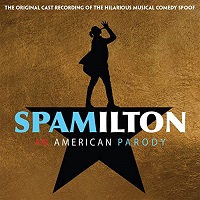 Original Off-Broadway Cast, 2017 (DRG)
Original Off-Broadway Cast, 2017 (DRG)  (5 / 5) Of course, you knew Gerard Alessandrini wasn’t going to leave Hamilton alone, but who would have predicted this? It’s a whole evening of Revolutionary spoofery, punctuated by multiple Forbidden Broadway-like riffs on other shows and stars of the day. And it works spectacularly well. Alessandrini’s engaging liner notes reveal his insecurity about learning to write rap and hip-hop, yet he appears to have mastered those forms thoroughly, betraying a show-tune sensibility only through his preciser-than-Lin-Manuel rhyming: “I’m getting nervouser, Sir/ Be terser in your verse, Sir/ You’re no Johnny Mercer.” After the briefest of full-orchestra intros, the music’s in the hands of Forbidden Broadway vet Fred Barton at the piano, and he supports one of the best casts Alessandrini was ever blessed with. How they manage to clearly utter every rapidly passing syllable, and land every joke, is a miracle. As Hamilton, Dan Rosales is Lin-Manuel Miranda with more voice. Chris Anthony Giles and Nicholas Edwards serve up wicked parodies of Leslie Odom, Jr. and Daveed Diggs. Glenn Bassett is King George in “Straight is Back,” Juwan Crawley plays all of the other guys, and in the women’s roles, Nora Schell is simply amazing; she transitions expertly and rapidly between Renée Elise Goldsberry and Philippa Soo with laser accuracy, also serving up delicious Bernadette and Audra cameos. (Her Barbra isn’t quite there yet.) Even Christine Pedi’s beloved Liza turns up for a funny “Down With Rap” turn. With virtually the entire Hamilton score lampooned, plus side trips into astute 2017 Broadway commentary and some outrageous musical-hybrid moments (An American Psycho in Paris, The Lion King and I), this album’s a nonstop party. — Marc Miller
(5 / 5) Of course, you knew Gerard Alessandrini wasn’t going to leave Hamilton alone, but who would have predicted this? It’s a whole evening of Revolutionary spoofery, punctuated by multiple Forbidden Broadway-like riffs on other shows and stars of the day. And it works spectacularly well. Alessandrini’s engaging liner notes reveal his insecurity about learning to write rap and hip-hop, yet he appears to have mastered those forms thoroughly, betraying a show-tune sensibility only through his preciser-than-Lin-Manuel rhyming: “I’m getting nervouser, Sir/ Be terser in your verse, Sir/ You’re no Johnny Mercer.” After the briefest of full-orchestra intros, the music’s in the hands of Forbidden Broadway vet Fred Barton at the piano, and he supports one of the best casts Alessandrini was ever blessed with. How they manage to clearly utter every rapidly passing syllable, and land every joke, is a miracle. As Hamilton, Dan Rosales is Lin-Manuel Miranda with more voice. Chris Anthony Giles and Nicholas Edwards serve up wicked parodies of Leslie Odom, Jr. and Daveed Diggs. Glenn Bassett is King George in “Straight is Back,” Juwan Crawley plays all of the other guys, and in the women’s roles, Nora Schell is simply amazing; she transitions expertly and rapidly between Renée Elise Goldsberry and Philippa Soo with laser accuracy, also serving up delicious Bernadette and Audra cameos. (Her Barbra isn’t quite there yet.) Even Christine Pedi’s beloved Liza turns up for a funny “Down With Rap” turn. With virtually the entire Hamilton score lampooned, plus side trips into astute 2017 Broadway commentary and some outrageous musical-hybrid moments (An American Psycho in Paris, The Lion King and I), this album’s a nonstop party. — Marc Miller


